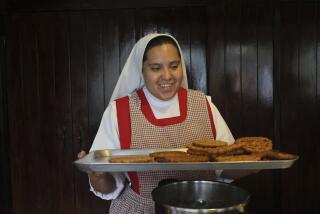Priest Savior to Madagascar Street Arabs
ANTANANARIVO, Madagascar — Her name means “A Sweetness People Love.” But there is a look in 13-year-old Mamitina’s coal black eyes that says she doesn’t believe in names.
Her father deserted her one night in November in a street of the Madagascar capital, leaving her in charge of three sisters and two brothers, one just 6 months old.
She begged for three days and nights, then walked into a haven run by a priest called Pedro who has heard stories like hers four thousand times.
It is impossible to stroll through tumbledown Antananarivo without attracting a train of ragged children pleading: “Monsieur, give me money.”
Visitors and residents all talk about the quatre mis --an ironic name for the homeless. It means “four walls.”
“Some nights I drive down this street to the office and I just can’t look,” said a Malagasy resident.
“I don’t want to see them sleeping on the pavement or begging in doorways. I can’t bear it but I just can’t change the world on my own.”
Nor can Pedro. But his eyes say he will try.
Two years ago he came to Antananarivo and found families living from the compacted rubbish of the municipal dump. They burrowed in, found bones and sold them for animal feed.
He got land from the government and created a village called Manantenasoa--”A Better Life.” His organization now provides four real walls for 4,000 of the quatre mis.
And they keep coming. “We get 25 more families every month. It never stops. I reckon there are 250,000 people in this town who don’t even get enough to eat,” Pedro said.
“It’s a disgrace. This isn’t Somalia. Somalia is a desert. But this is a rich agricultural country. It used to export food. But these people have been abused for years. It is a crime.”
The reason is not just the influx of job-seekers from the countryside that has created shantytowns around cities all over Africa.
Madagascar has gone in the past decade from poverty to virtual ruin.
Slash-and-burn farming has wrecked the land. The collapse of prices for coffee, vanilla and cloves has made the crops scarcely worth growing.
Soviet-style central planning, grandiose but unproductive projects and big military expenditure by President Didier Ratsiraka have brought the economy to its knees, diplomats say.
“We hope that one day Antananrivo will build factories. That there will be jobs. That this will be an industrial town. But until then. . . . “ Pedro’s attention is distracted by a new arrival seeking the comfort of a broad arm round his small shoulder.
“This town has doubled or trebled in size in the past few years. But at the same time only a couple of hundred houses have been built,” said Pedro, a Slovene who worked in the Madagascar countryside for 20 years before attacking the capital.
Pedro’s Akamosa organization provides shelter and food in return for work in nearby quarries or on handicraft projects. Parents come with entire families, sometimes a dozen people.
Others have not heard of the bearded priest and abandon their children or worse. “A woman walked up to our night guard the other day and tried to sell her child. It was wrapped under a shawl. When we lifted it, the child was naked,” said a businesswoman.
The arrivals are rehabilitated, educated, helped to overcome frequent drug or alcohol problems and given the opportunity to go back to the land if they have relatives with cooking and farming implements, a bus ticket and minimal pocket money.
Prostitution is rife among the girls of the street. Residents say they sell sex for less than the price of a soft drink.
“We send them to school to save them. We can’t perform miracles all the time but you’ll notice one,” Pedro told a visitor.
“When these kids here see you, they say ‘Bonjour.’ They don’t say, ‘Monsieur, give me money.’ ”
More to Read
Sign up for The Wild
We’ll help you find the best places to hike, bike and run, as well as the perfect silent spots for meditation and yoga.
You may occasionally receive promotional content from the Los Angeles Times.






